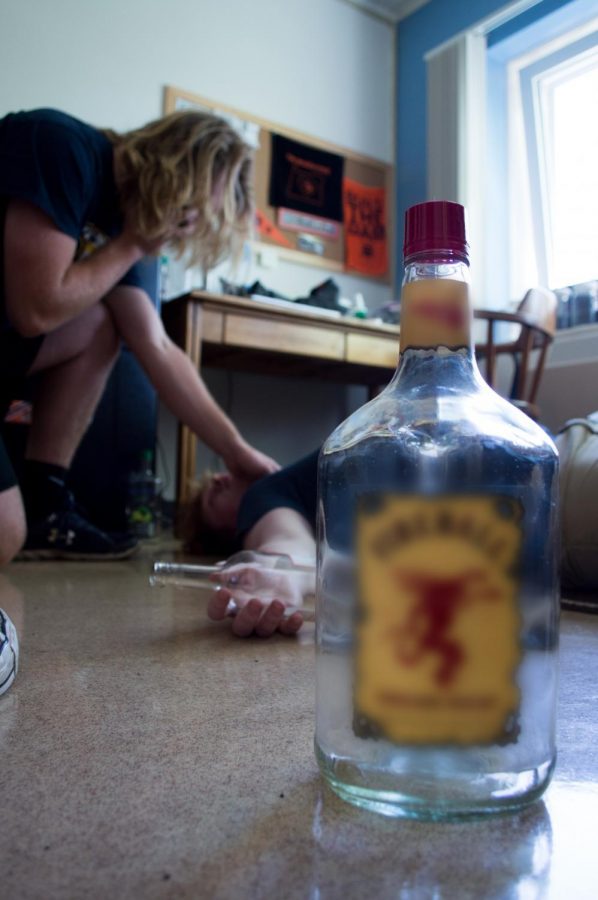Minors seeking emergency medical care receive MIP immunity
May 15, 2017
Sixty-eight percent of teens report they fear legal repercussions and citations when they drink, according to the Medical Amnesty Initiative. In a Cornell University study, it was concluded that 19 percent of college students reported medical assistance likely should have been called for incidents they were in where underage drinking occurred, but only 4 percent actually made the call.
The amnesty policy was put in place in various states nationwide to encourage individuals participating in underage drinking to seek medical assistance when needed, without the worry of legal repercussions. In Oregon, the Oregon Medical Amnesty Law from House Bill 4094, put into effect on Jan. 1, 2015, grants limited legal immunity to minors under the influence of alcohol when seeking help for themselves or another individual who is in need of emergency medical services, according to the Alcohol & Other Drugs page on the Pacific University of Oregon website.
The law (471.430(10)) states that immunity from prosecution for the violation of a Minor in Possession is granted to the person who is in need of medical attention, as well as the person who called for emergency medical assistance for that person, according to Lieutenant Daniel Duncan of the Corvallis Police Department.
“The immunity for MIP means they cannot be issued a citation for the violation of Minor in Possession of Alcohol,” Duncan said in an email. “It does not extend to other crimes such as Furnishing Alcohol to Minors, just (the) MIP itself.”
People that are participating in underage drinking that are not in need of medical attention and are not the individual who called for emergency medical assistance are not covered under the law, according to Duncan.
“The intent of the law is to make sure people get the help they need without fear of the violation, and allows others to seek help for another person as well, knowing they will not be prosecuted for taking care of someone they can tell is in need of immediate medical assistance,” Duncan said via email.
According to the Medical Amnesty Initiative, a year after implementing the Medical Amnesty policy, the number of alcohol-related emergency medical services calls increased by nearly 700 percent.
Oregon State University, along with the Prevention, Advocacy and Wellness team, aided in the process to get the Amnesty Law passed in the state of Oregon, according to the Alcohol and Drug Prevention & Education Program 2016 biennial review.
The Oregon Medical Amnesty Law now plays the same role on the OSU campus and in student residence halls as it does everywhere else in Oregon, according to Jill Childress, the assistant director of Student Conduct and Community Standards in University Housing and Dining Services at OSU.
In the OSU residence halls, alcohol consumption, possession or empty containers are prohibited for students who are under 21, according to Childress. Underage students at OSU are additionally prohibited from being in the presence of alcohol in the residence halls.
“In instances where medical amnesty applies, we still hold students accountable to OSU and University Housing and Dining Services policies, but the way sanctions are applied for students that are found in violation of institutional policies may look different,” Childress said in an email.
Student safety is the main concern in residence halls, according to Childress. The university also provides students with education about how to make positive, healthy decisions in regards to alcohol consumption.
“We are always in support of student safety first and we support options that reduce barriers to students getting help,” Childress said via email.
According to Rachel Grisham, the 2016-17 Associated Students of OSU president, OSU still has room to improve in regards to the Oregon Medical Amnesty Law.
“There’s still quite a few students who don’t know about (the Amnesty Law), but the most common ways that we get out that information is through prevention and advocacy-type work that Student Health Services does,” Grisham said.
According to Grisham, although the Oregon Medical Amnesty Law only protects the person in need of medical assistance and the person who called for emergency medical services, she is aware of circumstances where responding officers put all of their attention on the person in need of medical attention rather than dedicating any resources to other individuals at the location that may be participating in underage drinking.
“(The Amnesty Law) definitely allows students to be able to seek emergency response or medical attention when they previously might not have felt comfortable doing so or might have been in fear of punishment due to their age and what they were participating in,” Grisham said. “I think that it has vastly increased the access to these resources which is a really vital part to serving people on this campus.”
Underage drinking and overconsumption is a concern in any college town or campus setting, according to Duncan. The Oregon Medical Amnesty Law aids in the protection of those participating in underage drinking who find themselves in need of emergency medical services without imposing the worries of legal repercussions.
“Ultimately, saving a life is more important than issuing a citation for a violation,” Duncan said in an email.











































































































